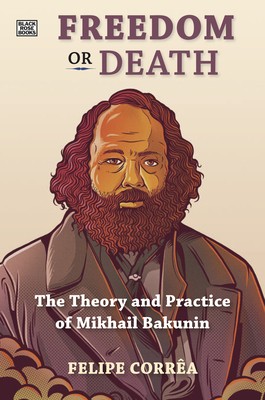
- We will send in 10–14 business days.
- Author: Felipe Corrêa
- Publisher: Black Rose Books
- ISBN-10: 1551648148
- ISBN-13: 9781551648149
- Format: 15.5 x 23.4 x 3.8 cm, kieti viršeliai
- Language: English
- SAVE -10% with code: EXTRA
Reviews
Description
Freedom or Death is a groundbreaking interdisciplinary study of the life and work of the Russian revolutionary and titan in the history of anarchism Mikhail Aleksandrovitch Bakunin (1814?76). Brazilian scholar Felipe Corrêa offers in-depth analysis of Bakunin's political theory produced between 1836 and 1876, anchoring it in his political-intellectual trajectory. The book is a history of Bakunin's political thought that encompasses all of his writings, his most important letters, and dialogue with his principal interlocutors, as well as synthesizing all previous scholarship. Corrêa systematically divides Bakunin's works into three major periods ? From Philosophy to Praxis (1836?43), Revolutionary Pan-Slavism (1844?63), and From Socialism to Anarchism (1864?76) ? to provide historical context and to fully understand the development and ultimate coherence of his radical thought. Corrêa analyzes Bakunin's landmark contributions to the shaping of anarchism (and of revolutionary syndicalism) and his considerable influence on other militants and on a sector of the European workers? movement. Both during his life and afterwards, his thought informed labour, Left and anti-imperialist organizing on all continents. Bakunin's theory and practice continues to hold great power for the global Left today, as anarchism offers a means of liberation from tyranny that has never been more urgent.
EXTRA 10 % discount with code: EXTRA
The promotion ends in 23d.17:11:09
The discount code is valid when purchasing from 10 €. Discounts do not stack.
- Author: Felipe Corrêa
- Publisher: Black Rose Books
- ISBN-10: 1551648148
- ISBN-13: 9781551648149
- Format: 15.5 x 23.4 x 3.8 cm, kieti viršeliai
- Language: English English
Freedom or Death is a groundbreaking interdisciplinary study of the life and work of the Russian revolutionary and titan in the history of anarchism Mikhail Aleksandrovitch Bakunin (1814?76). Brazilian scholar Felipe Corrêa offers in-depth analysis of Bakunin's political theory produced between 1836 and 1876, anchoring it in his political-intellectual trajectory. The book is a history of Bakunin's political thought that encompasses all of his writings, his most important letters, and dialogue with his principal interlocutors, as well as synthesizing all previous scholarship. Corrêa systematically divides Bakunin's works into three major periods ? From Philosophy to Praxis (1836?43), Revolutionary Pan-Slavism (1844?63), and From Socialism to Anarchism (1864?76) ? to provide historical context and to fully understand the development and ultimate coherence of his radical thought. Corrêa analyzes Bakunin's landmark contributions to the shaping of anarchism (and of revolutionary syndicalism) and his considerable influence on other militants and on a sector of the European workers? movement. Both during his life and afterwards, his thought informed labour, Left and anti-imperialist organizing on all continents. Bakunin's theory and practice continues to hold great power for the global Left today, as anarchism offers a means of liberation from tyranny that has never been more urgent.


Reviews